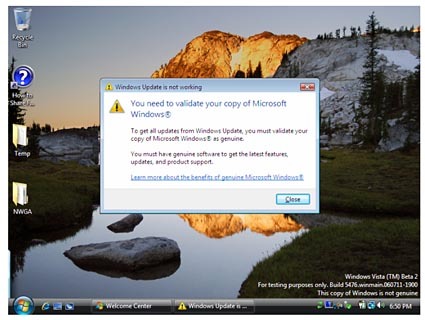Microsoft reduces feature set in pirated copies of Vista
Redmond (WA) - Windows Vista will introduce new tools that aim to make pirated versions less attractive and prompt users to activate a legally obtained copy of the operating system. Deeply integrated into the core of the software, Microsoft will reserve functionality such as the Aero Glass interface and Flash acceleration for Windows Vista versions that are validated.
Software activation has been a part of Microsoft software for some time - it was introduced with certain versions of Office 2000 in the U.S. and internationally with Windows XP. The mechanism, which requires the software to be "activated" within 30 days after installation in order to provide full functionality as well as access to Microsoft's download database, wasn't met with enthusiasm globally: Some nations feared that the activation, which asks for some personal data and generates a product key depending on twelve distinct system components, would invade the privacy of users.
The original idea of activation in Windows remains the same with Vista, but Microsoft said that it will use a stricter enforcement process, if the company cannot verify that a user owns a legal version of the operating system. While Microsoft only refused to provide product keys in the most obvious cases so far and software pirates were quickly able to work around the product key, Microsoft now says that it has integrated the protection platform "deeply into the operating system." According to the company, "product keys can be blocked for a number of reasons, including if the product key is abused, stolen, pirated or seized as a result of anti-piracy enforcement efforts." The firm said that product keys "can also be blocked if they are beta or test keys and have been disabled, if there were manufacturing errors in the keys or if the keys have been returned."
As with Windows XP, Windows Vista systems have to be activated with a "genuine product key" within 30 days after installation. If the software is not updated, the system will move into a "reduced functionality mode until a genuine product key is used to activate and a successful validation occurs."
In reduced feature mode, Vista will deactivate Microsoft's fancy Aero Glass interface, the anti-spyware tool "Defender," the utility "Ready Boost, which uses external flash memory devices to speed up applications, as well as access to downloads, including updates and new versions of the Windows Media Player and Internet Explorer. Non-activated versions of Vista will also display a persistent text message that reads "This copy of Windows is not genuine" in the lower right corner of the screen. Microsoft said that the "Software Protection Platform "has been under development for several years and that the company intends to use the technology first for Windows Vista and Windows Server "Longhorn." Eventually, more Microsoft products will adopt this technology.
Consumers who purchase a new PC with an OEM version of Vista will not be directly affected by this product activation. As it was the case with Windows XP, an OEM Vista will be pre-activated by the system builder and will not require the user to go through the activation process. OEM Vista protection continues to be tied closely to system hardware and BIOS, which means that frequent hardware upgrades - Microsoft allows a certain number of hardware changes within a certain timeframe - and BIOS changes could result in the removal of the product key.
The fact that most pirated copies of Windows have their origin in volume licensing agreements prompted Microsoft to revise its volume activation program. "Volume Activation 2.0 is new in Windows Vista and Windows Server "Longhorn" and requires the activation of each Windows Vista or Windows Server "Longhorn" license acquired under a volume licensing agreement."
Get Tom's Hardware's best news and in-depth reviews, straight to your inbox.
Related article:
Windows Vista's eye-candy will cost you at least $160
Microsoft: Windows Vista RC 1 "complete"
Tom's Hardware is the leading destination for hardcore computer enthusiasts. We cover everything from processors to 3D printers, single-board computers, SSDs and high-end gaming rigs, empowering readers to make the most of the tech they love, keep up on the latest developments and buy the right gear. Our staff has more than 100 years of combined experience covering news, solving tech problems and reviewing components and systems.


